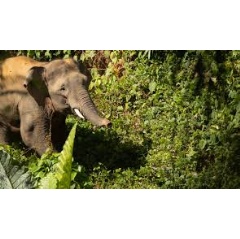How we’re working with WWF to restore forest ecosystems
WWF’s Sabah Landscapes programme in Malaysia combines conservation and sustainable development by integrating the protection of forests, wildlife and rivers into the production of RSPO certified palm oil.
Forests are essential to life. They are the lungs of our planet and help regulate our climate. But the world is losing them at an alarming rate. Which is why we’re working – both within our business and with others beyond it – to eliminate deforestation from our agricultural commodity supply chains like palm oil by 2023.
One way we’re doing this is by supporting WWF-Malaysia’s Sabah Landscapes programme. This combines conservation and sustainable development by integrating the protection of forests, wildlife and rivers into the production of Roundtable on Sustainable Palm Oil (RSPO) certified palm oil and the restoration of ecological corridors.
RSPO certification and elephant migration
Sabah – which is home to critically endangered local species – has lost half its tropical forest, mostly to the industrial agriculture of oil palms. To protect against further losses, the government has committed to setting aside half of the state as forested land and meeting the highest standards for responsible palm oil production by 2025.
That means all producers will be required to achieve RSPO certification which, according to the WWF, will also reduce greenhouse gas emissions by 17 million tonnes by 2030.
The WWF Sabah Landscapes programme supports the RSPO certification of 60,000 hectares of oil palm plantations, most of which is farmed by ‘outgrowers’ – these are larger than smallholders but not as big as commercial estates with palm oil mills. By doing so, it plans to supply the market with some 1.1 million tonnes of sustainably grown oil palm fruit bunches annually.
It also supports work to replant two wildlife corridors, which will restore forest habitats and improve the connectivity between fragmented forest blocks. These physical connections allow for migration, colonisation and interbreeding of plants and wildlife.
In this case, the corridors link the Ulu Kalumpang Forest Reserve and Tawau Hills Park to the Ulu Segama Forest, which is part of the larger central forest complex covering almost 250,000 hectares – an area more than three times the size of Singapore.
This helps facilitate the movement of elephants between the two. It also manages human–elephant co-existence, both to reduce crop damage from elephants and to reduce the risk of elephant and human deaths.
Two riparian (riverside) reserves in Sugut and Kinabatangan will also be restored to improve water quality.
“We welcome this opportunity to work with WWF and other partners in the Tawau, Lower Sugut and Kinabatangan landscapes to protect wildlife, produce sustainable palm oil and restore important natural habitats,” says Rauf Prasodjo, Unilever Sustainable Sourcing Manager. “It’s a positive step towards stopping deforestation and protecting vital forest landscapes.”
Transformational change
This programme takes what’s called a ‘jurisdictional’ approach, which is where all interested parties across an entire landscape – government, private sector, civil society and local communities – identify shared sustainability goals, then put in place planning, policies and incentives to meet them.
Nicholas Fong, WWF-Malaysia, explains the concept: “The aim is to get diverse stakeholders to come together and agree on how to balance competing land-use needs – to talk through how we can produce palm oil but also have healthy rivers and protect our forests and wildlife.”
Our work with WWF-Malaysia is part of our efforts to drive true transformational change in the palm oil industry, which means going beyond our work with suppliers and our own supply chain. We work extensively on national and global levels with NGOs, governments, industry partners and smallholder farmers to change practices, fight deforestation and make a real impact on the ground.
Through programmes like this, we are contributing to the achievement of SDG 15, Life on Land – specifically to target 15.2 on promoting sustainable forest management, halting deforestation and restoring degraded forests.
-----
https://www.youtube.com/watch?v=WmhEC-tmpyE&feature=emb_title
( Press Release Image: https://photos.webwire.com/prmedia/6/269054/269054-1.jpg )
WebWireID269054
This news content was configured by WebWire editorial staff. Linking is permitted.
News Release Distribution and Press Release Distribution Services Provided by WebWire.

